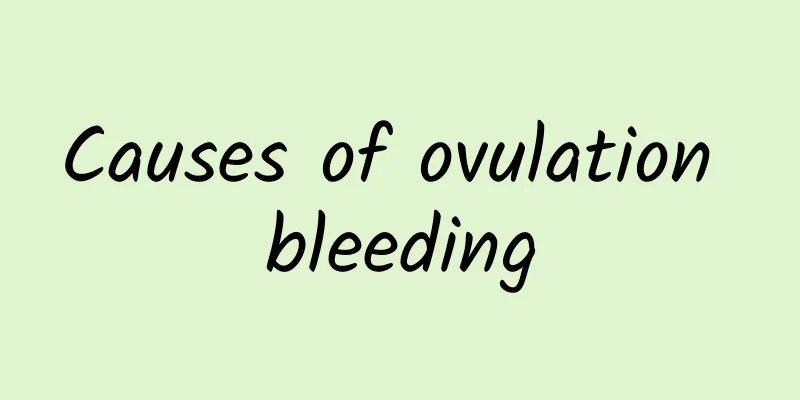Causes of ovulation bleeding

|
In life, some women will experience bleeding after menstruation. The amount is not much, there is no odor, and there will be slight pain in the lower abdomen. In fact, this is a symptom of ovulation bleeding. There are many factors that cause ovulation bleeding. We must understand and master them in order to do a good job of daily prevention. The following is an introduction to the causes of ovulation bleeding. I hope it can help everyone. 1. Excessive fluctuations in hormone levels: Estrogen levels drop rapidly after ovulation, causing the endometrium, which is affected by estrogen and undergoes a proliferative reaction, to lose support and cause a small amount of bleeding. 2. Chronic inflammation of the endometrium: The endometrium becomes obviously congested during ovulation, or when ovulation occurs, the blood vessels on the surface of the ovary happen to rupture, the amount of bleeding increases compared to normal and flows back into the uterine cavity with the peristalsis of the fallopian tube and is discharged from the body through the vagina. 3. Insufficient luteal function: If the secretion of progesterone is disordered, it will lead to a deficiency of estrogen and progesterone. At this time, the endometrium cannot be renewed normally, or the endometrium is prone to adverse reactions, which can lead to symptoms of small amounts of bleeding a few days before the menstrual period. This phenomenon will continue until the official onset of menstruation. 4. Incomplete atrophy of the corpus luteum: If the corpus luteum atrophies, estrogen and progesterone will not drop rapidly, and the shedding of the endometrium will be irregular, which will lead to bleeding. The endometrium will be obviously congested during ovulation, and the bleeding will not stop on its own. It will flow back into the uterine cavity with the peristalsis of the fallopian tube and be discharged from the body. During ovulation, the estrogen level of women will drop significantly, which cannot support the normal growth of the endometrium, so a small amount of bleeding is likely to occur. It is normal for women to have a small amount of bleeding during ovulation. Generally speaking, it is almost difficult to detect with the naked eye. This is a normal metabolic phenomenon of the human body and there is no need to worry too much. If obvious bleeding is found, you need to consult a professional doctor. |
<<: How to prevent ovulation bleeding
>>: What are the factors that cause miscarriage?
Recommend
What can I eat to make my uterine fibroids smaller? What can I eat to make my uterine fibroids disappear?
Uterine fibroids are a common gynecological disea...
Symptoms of bacterial vaginosis in women
Vaginitis refers to an inflammation of the female...
What to do if the left ovarian cyst is very painful
If you experience severe pain from a left ovarian...
How can thick endometrium be treated?
Endometrial thickness is a common gynecological d...
Types of uterine bleeding in patients with functional uterine bleeding
Dysfunctional uterine bleeding is characterized b...
Is pelvic effusion an inflammation?
Simply draining the effusion is a wrong treatment...
How much does it cost to treat endometrial thickening?
Many diseases not only affect patients physically...
What medicine is good for endometriosis?
Medical treatments for endometriosis mainly inclu...
TCM Syndrome Differentiation and Treatment of Uterine Fibroids
Uterine fibroids, also known as uterine leiomyoma...
How to perform an abortion
How is an abortion performed? Abortion is divided...
What are the chances of curing threatened abortion?
What is the chance of curing threatened abortion?...
Patients with ovarian cysts should undergo timely examination
In recent years, the incidence of ovarian cysts i...
Don’t gain weight during the Chinese New Year! 7 Tips for Smart Eating
The Spring Festival is a time for families to reu...
What are the causes of menstrual disorders?
What are the causes of menstrual disorders? Due t...
How to treat pelvic inflammatory disease pain? Pay attention to a light diet
Pelvic inflammatory pain is a common symptom of p...









